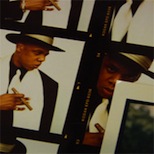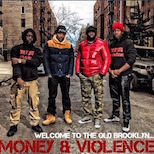“Revenge Of The Green Dragons” Explores Asian-American Gang Lore
10.29.2014
LEISURE
Revenge of the Green Dragons is a film chronicling the stories of two Asian-American immigrants, Sonny and Steven. While still children, the two are initiated into a local gang known as The Green Dragons, and soon become deeply involved in gang life and a world of crime. Executive produced by Martin Scorsese and directed by Andrew Lau and Andrew Loo, the film is inspired by a compelling New Yorker article of the same name from the early 1990’s, which had been written by Frederick Damnen, and plays with themes such as the concept of the American Dream and racism. Here, directors Andrew Lau and Andrew Loo discuss Revenge of the Green Dragons with Life+Times.
Life + Times: What was it about Frederick Dannen’s Revenge of the Green Dragons that resonated with you?
Andrew Loo: When you read the article you see that it’s a sort of classic exposé on crime and it’s very well-researched. There are so many different characters. There are larger than life events that take place. It’s all nearly wrapped in the context of sort of a gang story, but being that we’re Asian it was also for us, a very insightful look into the Asian-American experience. You hear about: Send us your tired, send us your poor, send us your hungry masses, and if you work hard and keep your nose clean good things will follow. Well, that isn’t always the case. There’s no guarantee by coming here. In fact, one of the dark and dirty secrets in America is that it has always relied on cheap and often times, illegal labor. It’s how this country was built. And so if you really look into other issues in that context, that started to become where we jumped in. That was the exciting the part. There’s the context of what was happening with this gang and why they were here.
L+T: What kind of research went into making the film as authentic as possible?
A. Loo: We met with surviving gang members, which was critical in terms of having insight into the behavior and the simple, but important things like what they ate, what they wore, how they did their hair, the music they listened to, etc. All of those things make this real. The woman who plays the mother of the two boys was actually best friends with the Tina character. She lived with Tina when Tina disappeared. That whole library scene is how they communicated with each other. They sent notes through the books in the library. There’s a lot of real stuff in there which hopefully lends a real truthfulness and authenticity. Even though it’s a work of fiction people like Frederick Damnen can watch and say, “Wow. That’s truthful.” Of course, there are specifics that for the sake of drama were tweaked, but it’s truthful.
L+T: What is the significance of having that specific speech by Ronald Reagan in the opening scene?
Andrew Lau: Of course, the timing and the period are significant. You know this is the 1980s by seeing that speech. He also mentions the problems like immigration. It just helps the audience catch the story really fast. It’s a really good introduction for us.
A. Loo: There are a couple of practical reasons. It’s a period film. These are real presidents from a specific time in America’s history. It assists us in pegging a timeframe for the audience, so they know where they are and where the story is taking place. It gives them the context, which is important, because New York today is entirely different from New York then.
L+T: There’s a scene where one of the main characters, Steven witnesses a rape the gang takes part in. He is noticeably affected by what he’s seen. Is that scene an attempt at humanizing his character?
A. Loo: Absolutely. He’s not dead, so how can he not be horrified at what just happened. He thinks they’re just going to go grab some money and no one is going to get hurt. It’s just a tax to his uncle Charlie. It’s just a few thousand dollars to him. What’s the big deal, right? But often times there are unexpected consequences to the choices that you make. I often say, bad things often come out of good intent. He didn’t intend for anybody to get hurt, and that was important, especially for the audience. It’s a very brutal world, a very violent world, a man’s world, even though it’s populated by boys. I think for an audience that’s not use to seeing, first of all, an Asian film populated with people and stories they aren’t familiar with it was important to give them something fundamental to hold on to. It was important to give them some kind of moral balance, so that’s why the Sonny character is built the way he is. People see that world through him more so then other characters. Those guys are from another place and another culture. You watch it, but don’t feel as connected. So it’s important to have the Sonny character, but also because Sonny’s brother is Steven, to also bring some of that to him as well, so that when he does die there’s a power to that also.
L+T: There’s a scene where one of the main characters, Steven witnesses a rape the gang takes part in. He is noticeably affected by what he’s seen. There’s a scene where a character says, “Behind every great fortune there’s a great crime.” Do you believe this to be true?
A. Lau: We believe. There’s a Chinese belief that what goes around comes around.
A. Loo: Do we believe it to be true that there’s always something rotten in Denmark? Yes, there’s always something else besides what meets the eye. It’s why the film ends the way it does. You have your moral hero being done in by the forces of the gang.
L+T: Do you think the second-class citizenship the Asian-American communities were subjected to during this period played a major role in leading many of these young people to lives of crime?
A. Loo: I think with a lot of Asian immigrants they arrived in America and quite frankly, there wasn’t really an infrastructure that allowed them to legally and constructively pursue their personally dreams, their economic dreams and their whole reason why they gave up everything just to come here. You either had a choice of being an indentured slave working in a kitchen or doing laundry and slaving twenty hours a day working in a sweatshop. Those were your choices. And yes, people would certainly do that and sleep fifteen to a room and all of those things. A lot of people chose that path, but there were a lot of other, less legal options available. If you were smart and you thought your time was worth money, you may have chose that way of crime and illegal activity. I spoke with a woman who lives in Chinatown. She was telling me that back then you couldn’t start your business unless you had $5,000 in cash, because those gangs would come and shake you down. The cost of business wasn’t just the rent, the chairs, the tables and the salaries. Everyone knew that, including the business owners and the gangs. Anyone wanting to get into illegal activities knew that that was a revenue stream for them. It was either you go slave in a sweatshop or you walk into a shop with a gun and demand your money. The Green Dragons and gangs like them were smart about it. They weren’t idiots. They knew that as long as they behaved in this certain way and they kept to themselves and victimized their own, they pretty much had a nice little thing going. I think there is a lot of that in the movie.
L+T: How did Martin Scorese become involved with the film?
A. Lau: We got the script and suddenly someone – I’m not sure who – said Martin can be the producer. We passed the script to Martin and he said, “Yes.”
A. Loo: It was as if he said, “Gangs? New York? Let’s do it!” [laughs]
A. Lau: Sometimes it can be that simple. Maybe it was because he and I have the relationship because he remade the movie I directed called, Infernal Affairs for it to be The Departed. Of course, it was good for us. It makes it easier for us to find investors and make the movie a reality. It was very important to have Martin say, “Yes.”
L+T: A few critics have pointed out similarities between Revenge of the Green Dragons and Goodfellas. Do you think those are unfair comparisons?
A. Loo: It’s understandable. People have to have a handle of what they are going to watch. There has to be a context. There has to be something for people to say, “Oh that’s an interesting film.” That’s just how we communicate with one another. Hopefully, people understand that this is its own film that stands in its own light, and also that it’s an American film. If you care about the history of this country, hopefully, it’ll pay off in you going to watch this movie.





